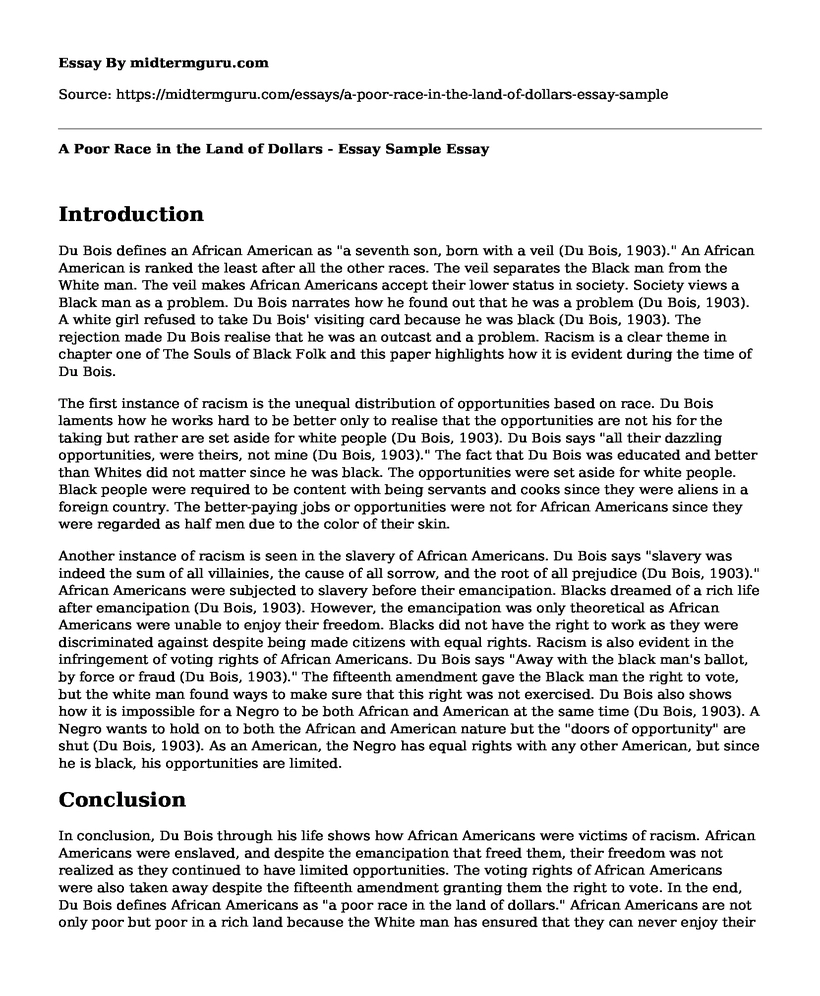Introduction
Du Bois defines an African American as "a seventh son, born with a veil (Du Bois, 1903)." An African American is ranked the least after all the other races. The veil separates the Black man from the White man. The veil makes African Americans accept their lower status in society. Society views a Black man as a problem. Du Bois narrates how he found out that he was a problem (Du Bois, 1903). A white girl refused to take Du Bois' visiting card because he was black (Du Bois, 1903). The rejection made Du Bois realise that he was an outcast and a problem. Racism is a clear theme in chapter one of The Souls of Black Folk and this paper highlights how it is evident during the time of Du Bois.
The first instance of racism is the unequal distribution of opportunities based on race. Du Bois laments how he works hard to be better only to realise that the opportunities are not his for the taking but rather are set aside for white people (Du Bois, 1903). Du Bois says "all their dazzling opportunities, were theirs, not mine (Du Bois, 1903)." The fact that Du Bois was educated and better than Whites did not matter since he was black. The opportunities were set aside for white people. Black people were required to be content with being servants and cooks since they were aliens in a foreign country. The better-paying jobs or opportunities were not for African Americans since they were regarded as half men due to the color of their skin.
Another instance of racism is seen in the slavery of African Americans. Du Bois says "slavery was indeed the sum of all villainies, the cause of all sorrow, and the root of all prejudice (Du Bois, 1903)." African Americans were subjected to slavery before their emancipation. Blacks dreamed of a rich life after emancipation (Du Bois, 1903). However, the emancipation was only theoretical as African Americans were unable to enjoy their freedom. Blacks did not have the right to work as they were discriminated against despite being made citizens with equal rights. Racism is also evident in the infringement of voting rights of African Americans. Du Bois says "Away with the black man's ballot, by force or fraud (Du Bois, 1903)." The fifteenth amendment gave the Black man the right to vote, but the white man found ways to make sure that this right was not exercised. Du Bois also shows how it is impossible for a Negro to be both African and American at the same time (Du Bois, 1903). A Negro wants to hold on to both the African and American nature but the "doors of opportunity" are shut (Du Bois, 1903). As an American, the Negro has equal rights with any other American, but since he is black, his opportunities are limited.
Conclusion
In conclusion, Du Bois through his life shows how African Americans were victims of racism. African Americans were enslaved, and despite the emancipation that freed them, their freedom was not realized as they continued to have limited opportunities. The voting rights of African Americans were also taken away despite the fifteenth amendment granting them the right to vote. In the end, Du Bois defines African Americans as "a poor race in the land of dollars." African Americans are not only poor but poor in a rich land because the White man has ensured that they can never enjoy their freedom and exercise their rights fully.
Reference
Du Bois, W.E.B. (1903). The Souls of Black Folk. Chicago: A.C. McClurg and Co.
Cite this page
A Poor Race in the Land of Dollars - Essay Sample. (2022, Nov 03). Retrieved from https://midtermguru.com/essays/a-poor-race-in-the-land-of-dollars-essay-sample
If you are the original author of this essay and no longer wish to have it published on the midtermguru.com website, please click below to request its removal:
- The Impact That Illegal Immigration Has on the America Economy - Essay Sample
- Essay Sample on Workplace Problems: Bullying
- Income Inequalities in China: Research Proposal
- Essay Sample on Medical Use of Marijuana
- Do Women Elected to Office Make a Difference? - Essay Sample
- The Social Aspect of Bullying - Research Proposal
- Socio-Economic Status Impacts Health of Society & Self - Essay Sample







